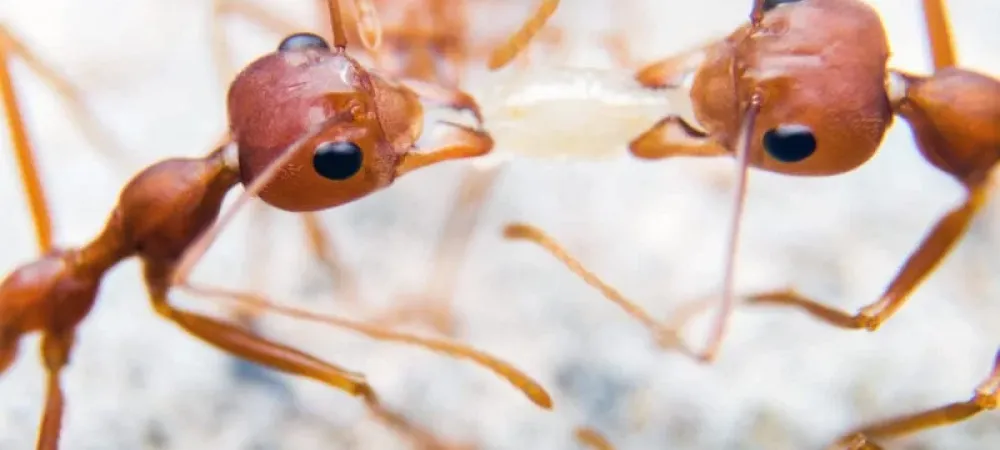The Neverending Battle with Atlanta’s Fire Ants

These insects may be small, but they pack a fierce punch. If you’ve ever been bitten by one of these little insects, you know exactly how they got their name. The bite of one of these ants will give you a new respect for these creatures and a whole new fear.
While just one bite from a single ant is enough to cause great pain and allergic reactions in some, imagine what bites from ten or a thousand of them can do. This isn’t just some made-up scenario. It’s a genuine possibility here in Atlanta where fire ants have made their home. With no natural predators, these ferocious bugs are free to spread throughout the south, invading yards and posing a threat to pets and children.
Not only are fire ants incredibly dangerous, but they can also wreak havoc on your yard. A colony can swell to numbers in the thousands, all obeying the queen. As their expansive tunnel system expands they feed on the tender roots of your grass and plants. Because of their size, you might not even realize fire ants are causing the problem.
However, there are methods to control fire ants:
Understanding Fire Ants
To fight your enemy you have to know your enemy. The type of fire ants that persist here in Atlanta, are not native to the U.S. In fact, they originated from South America sometime in the 1930s and ended up migrating to Texas. Quite comfortable with the warmer temperatures, now there is hardly a place in the south that doesn’t have them.
These imported fire ants are more aggressive than their North American cousins. Fire ants are not shy about attacking animals and humans that happen upon their nests. Fire ants are a competitive and hardy species that don’t respond well to traditional ant control products.
Single Queen and Multiple Queen Fire Ants
There are two kinds of imported fire ants; the single-queen and multiple-queen types.
Workers in single-queen colonies tend to forage within their territory, which they protect with their lives. On the other hand, workers from multiple-queen colonies are not territorial at all. Instead, they hop from one mound to another.
A single-queen colony can contain 40-150 mounds inside an acre and contain up to seven million ants. A multiple-queen colony may have over 200 mounds and 40 million ants! Maybe the easiest thing to do is move!
Identify the Problem
Like most ants, fire ants are small and live underground. Spotting them is often difficult unless you are looking for them. Usually, what homeowners see first are the dirt mounds. These mounds are the excavated dirt from a massive network of underground tunnels. By the time you see a mound, the colony has already been growing for months. The bigger the pile, the bigger the colony, and colonies can reach populations of up to 500,000 ants and spread out over an area as big as an acre.
Much like bees behave when disturbed, fire ants quickly respond to disruptions around their nest, such as lawnmowers, children playing, or curious pets. Their response is quick, painful, and potentially deadly.
Controlling Fire Ants
Fire ants can’t be eliminated entirely because it’s impossible to treat all infested areas. Thus the goal of current integrated pest management programs is to suppress fire ants as much as possible with biological control methods and use insecticides only where it is economically and environmentally justifiable to do so.
When targeting fire ants in your yard, you need a plan. Trying to kill every single ant is a fool’s errand and will just end up wasting your money. It’s impossible to reach every single ant, especially when there are hundreds of thousands of ants under your feet in a tunnel network that can stretch up to 25 feet in any direction.
There are plenty of home remedies that claim to kill fire ants (many of them just make them angrier), but your ultimate goal is to kill the queen. You could kill 99% of the colony but, if the queen remains, the colony will rebuild and be back in no time. Think of ants as an alien race that has invaded your yard. The soldiers take orders from the queen. Kill the queen, save the yard.
Mound Treatments
Mound treatments can be found at any hardware store, and, as it sounds, you treat the mound. These baits usually come in the form of dust that you apply over the visible mounds. The poison is usually coated on grains that the ants will eat. These poisons are not designed to kill immediately but instead act slowly, giving the soldier ants enough time to deliver it to the queen. While this is an effective way to destroy the colony, it does not prevent other colonies from moving in or ants from the old colony finding a new one.
Contact Insecticide Treatments
Contact insecticide treatments are long-lasting insecticides applied to your lawn and landscape surface. These products are slow-acting but longer lasting. Faster acting contact insecticides eliminate ants on the surface for months but may not get to the colonies lying deeper in your soil.
Get Professional Treatment
Fire ants are angry and dangerous. Depending on the size of the colony, you might be in over your head. That’s where the professionals at Environmental Turf come in. We have years of experience battling these firey pests. We know what works and what doesn’t. We offer effective fire ant control solutions that exterminate these backyard bugs, no matter where they are hiding.
We use safe and proper methods to treat fire ants at competitive prices. Our trained, qualified, and experienced staff members will provide you with top-quality fire ant control. Eliminate fire ants by contacting us now. Want to discover more tips and ideas? Check out our other blog articles. Or visit us on Facebook and connect with us on a more personal level.



